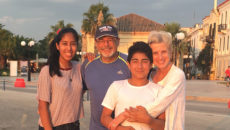Answering the question “Who am I?” is the key developmental task of adolescence. Identity formation involves the incorporation of values, beliefs, talents, intellectual capabilities, sexual self-image, personality traits, racial and ethnic heritage, personal expectations, and physical characteristics. The journey requires a teen to assess his similarities to and differences from his parents.
Adoptees have a more complex quest, as they are assessing their interests, personalities, talents, and so on compared to those of their birth parents as well as those of their adoptive family. Transracial adoption adds another layer, as these teens must integrate racial and cultural differences into their “search for self.” These differences may not present internal conflicts until adolescence, when peer and external influences really begin to matter.
Teens with some degree of contact with their birth families will have to make decisions about how to put all the different pieces together. And yet, identity formation can be even more challenging for teens with little or no information about their birth families — grappling with unknowns is more complex than integrating even a large amount of concrete details from two different families.
Straddling Two Worlds
Mark, a 16-year-old African-American who was transracially adopted, felt that being adopted was “no big deal,” except when he was out in public with his family. He hated the stares, some of which he saw as “disapproving.” While his parents had prepared him to handle racial slurs about his race, he was surprised and deeply hurt when racist comments were made about his White parents. Mark had both African-American and Caucasian friends, but there were days when he did not feel like he “fit in” with either group. Mark needed support to balance his dual identity. Meeting other African-American transracial adoptees helped him to feel confident negotiating both aspects of his identity.
Unique Journeys
Identity formation is a highly individual process, so it can be very different even for siblings adopted from similar backgrounds raised in the same family. Karen and Cindy, both adopted as infants from South Korea, had little birth history knowledge beyond knowing their place of birth. The sisters have always had a close relationship.
Now in her late twenties, Karen has embraced her Korean heritage. She has traveled to South Korea and sought reunion with her birth family. Her friendship circle includes many Korean adults, as well as those of other races and cultures. Her love of her ethnic heritage began in her early teens, when she filled her life with Korean music, books, and food. Although the sisters remain personally very close, Cindy does not share her sister’s interests. She did not accompany Karen on her trips to their birth country. She married a Caucasian man and identifies as “American.”
In Need of Acceptance
Teens who doubt that their differences are truly accepted by their adoptive families are especially at risk for feelings of rejection and a lack of self-acceptance. Yolanda was an overweight teen who concentrated on her creative and artistic talents rather than academics. Her very trim parents were both college professors. Despite her parents’ love and support, Yolanda struggled with low self-esteem and often engaged in self-destructive behavior. She endlessly pondered what her life would have been like if she had been raised by her birth family — people she believed to be just like her. In early adolescence, Yolanda insisted that she wanted to meet her birth family. Having watched Yolanda struggle with identity confusion for years, her parents agreed that it was time.
Discovering how she was both like and unlike her birth family brought Yolanda to a new appreciation for the qualities she shared with her adoptive parents, including their values. Yolanda gradually began to embrace all parts of herself, lifting the burden of self-doubt that she had suffered with for years. She says, “My birth family gave me my genetic predisposition for my interests, and my skills and gifts. My adoptive family gave me the opportunities, encouragement, and support to develop them to their fullest potential.”



